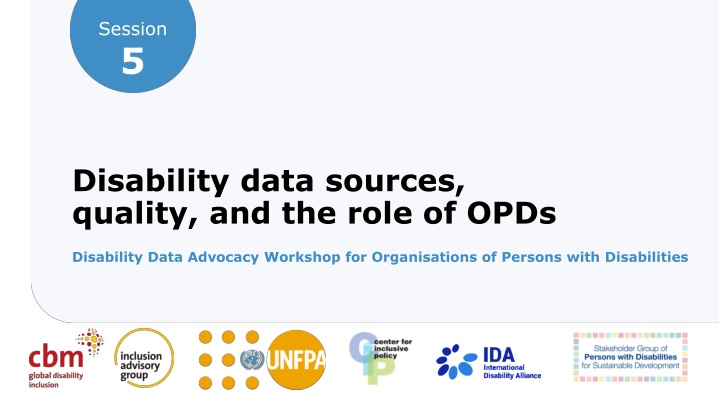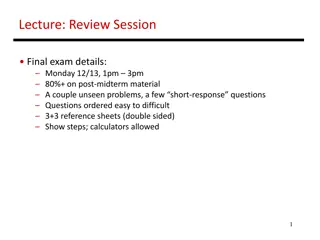
Disability Data Sources, Quality, and Advocacy Workshop Insights
Explore different disability data sources, their advantages, and disadvantages. Learn key tips for ensuring data quality in advocacy work and how to use data effectively for informed advocacy efforts. Discover where data can be sourced, including censuses, surveys, and other qualitative sources. Get insights on using accurate evidence to influence policy decisions and identifying specific data needs for effective advocacy.
Download Presentation

Please find below an Image/Link to download the presentation.
The content on the website is provided AS IS for your information and personal use only. It may not be sold, licensed, or shared on other websites without obtaining consent from the author. If you encounter any issues during the download, it is possible that the publisher has removed the file from their server.
You are allowed to download the files provided on this website for personal or commercial use, subject to the condition that they are used lawfully. All files are the property of their respective owners.
The content on the website is provided AS IS for your information and personal use only. It may not be sold, licensed, or shared on other websites without obtaining consent from the author.
E N D
Presentation Transcript
Session 5 Disability data sources, quality, and the role of OPDs Disability Data Advocacy Workshop for Organisations of Persons with Disabilities
Session overview 2 Disability Data Advocacy Workshop for Organisations of Persons with Disabilities SESSION 5
Overview of session Provide an overview of different disability data sources and their advantages and disadvantages. Explore key tips for ensuring data quality for your advocacy work. Understand how to use this data to inform your advocacy including: Using accurate evidence to support or contest policy and programme decisions, Identifying specific data needs to request in your data advocacy 3 Disability Data Advocacy Workshop for Organisations of Persons with Disabilities SESSION 5
Sources of data 4 Disability Data Advocacy Workshop for Organisations of Persons with Disabilities SESSION 5
Where can data be sourced? Censuses Surveys of people (multipurpose, topic specific, health, disability) Surveys, evaluations etc. by organisations Administrative systems (focused on non-disability and disability programmes) Other qualitative sources like in-depth interviews and case studies Others? 5 Disability Data Advocacy Workshop for Organisations of Persons with Disabilities SESSION 5
Census Definition: A census is an official count of all members of a group. Population censuses determine the total number of people in a country or part of a country and collect information on their characteristics such as age, sex, or where they lived. Information is usually collected using questionnaires with data collected at set intervals of time (e.g., every 5 or 10 years). Not every census includes questions on disability. Advantages When they do include data on persons with disabilities they can be a good source of data for disaggregating indicators (e.g., SDG indicator on persons with disabilities in employment). Limitations On the number of questions that can be included Limited control over enumerators due large scale population coverage can impact quality of data. 6 Disability Data Advocacy Workshop for Organisations of Persons with Disabilities SESSION 5
Surveys gathering data on specific themes Definition: Surveys obtain information about people or organisations using questionnaires and other data collection tools. They are one of the most important sources of social and demographic statistics. Surveys can obtain information on multiple topics or can focus on one topic such as labor force surveys, living standards surveys, health surveys, education surveys, transportation surveys, and so forth. Surveys can obtain information on households and the people living in them, on establishments such as hospitals and the services they provide, or on individuals based on one or more characteristics, such as occupation. Advantages Good source of data for disaggregating indicators related by disability status when questions to identify the population with disabilities included Can add additional questions especially on barriers and facilitators to full participation on a periodic basis Limitations On the number of questions that can be included Sample size may limit the stability of estimates for any subgroup 7 Disability Data Advocacy Workshop for Organisations of Persons with Disabilities SESSION 5
Surveys that are disability specific Like other surveys, but disability specific. The source of the most comprehensive data on functioning and disability Advantages: Best opportunity to add additional questions on barriers and facilitators to full participation. Limitations: Sample size may limit the stability of estimates for any subgroup but can increase quality of data collection. Generally, not done on a set schedule and there are usually long gaps. Changes in design and questions asked make it a poor source of data for tracing progress on SDG inclusion. Sample needs to be large enough to provide stable estimates for the population with disabilities, which presents design challenges. 8 Disability Data Advocacy Workshop for Organisations of Persons with Disabilities SESSION 5
General administrative data systems Definition: Administrative data systems are data collections that are held by institutions belonging to the governmental sector , and that are collected and used for administrative purposes such as taxes, benefits or services. Administrative data is data derived from an administrative system. The source of data is the participant s administrative records rather than direct contact with the participant, although information included in administrative records can be obtained directly from participants. Advantages: Available source of information for disaggregation if items identifying the population with disabilities is included in the data system Limitations: Provides information on all persons served by the programme for which the administrative data is kept. But only those who meet eligibility criteria and, for many systems, who choose to obtain services through the programme will be included The disability indicator used by the programme may not produce high-quality data or address the aspects of the disability of interest. Data quality can be an issue for all items but especially for data items not needed to administer the programme. 9 Disability Data Advocacy Workshop for Organisations of Persons with Disabilities SESSION 5
Disability-related administrative data systems Definition: Administrative data systems are data collections that are held by institutions belonging to the governmental sector, and that are collected and used for administrative purposes such as taxes, benefits or services. Many administrative systems do not target persons with disabilities (e.g., education management information system, social protection registries, registration of births, deaths) but there are administrative systems for programmes that provide services and benefits to persons with disabilities. Advantage Source of information on disability services or benefits provided by the programme. Limitations Provides information on all persons served by the program to which the administrative data system is designed. Only includes those who meet eligibility criteria and who choose to obtain services through the programme tied to the administrative system. Eligibility criteria for those included in the program might not match the population of interest. Data quality can be an issue - especially for data items not needed to administer the programme. 10 Disability Data Advocacy Workshop for Organisations of Persons with Disabilities SESSION 5
Key tips for checking data quality 11 Disability Data Advocacy Workshop for Organisations of Persons with Disabilities SESSION 5
Checking data quality Accuracy: The data is reliably true and correct Relevancy: the data should meet the requirements for the intended use. Completeness: the data should not have missing values or missing data records. Timeliness: the data should be up to date. Consistency: The data can be cross referenced with other sources to produce the same result. Data reflecting the above points strengthens your advocacy. ACTIVITY: Reviewing data sources and quality 12 Disability Data Advocacy Workshop for Organisations of Persons with Disabilities SESSION 5
Data collection and OPDs 13 Disability Data Advocacy Workshop for Organisations of Persons with Disabilities SESSION 5
The CRPD and the involvement of persons with disabilities and OPDs in data The CRPD ensures a role for persons with disabilities in inputting into policies and decisions in all areas of life, this also includes in data collection by governments. Governments that have ratified the CRPD have an obligation to collect data to assist with policy formulation. OPDs have a role in advocating that this happens and in advocating for better data. Persons with disabilities can be trained as enumerators and OPDs can be involved in data collection. 14 Disability Data Advocacy Workshop for Organisations of Persons with Disabilities SESSION 5
Interviewer training for OPDs Interviewers should ask the questions as they are written. They should not improvise. Interviewers should not use the term disability at any point of the data collection unless it is explicitly written as part of the question. Interviews should make sure the respondent answers each question and shouldn t assume a response by observation. If the interviewer is uncomfortable, the respondent will be too so interviewers need to be familiar with the material and be relaxed. Training on interviewing persons with disabilities should be part of standard interviewer training for all data collections (not just those related to disability. 15 Disability Data Advocacy Workshop for Organisations of Persons with Disabilities SESSION 5
Data collection with persons with disabilities Data collection procedures should be accessible so persons with disabilities can participate this is best practice in all data collections. Obtaining information from the individual should be done when possible. If not possible and a proxy is used, then an explanation should be provided by the interviewer. 16 Disability Data Advocacy Workshop for Organisations of Persons with Disabilities SESSION 5
Summary of key points There are multiple sources of data on disability all have advantages and disadvantages. The data source should be appropriate for the intended use and the data should meet basic quality standards. Well developed and tested questions are necessary but not sufficient requirement for good data appropriate training, translation and administrative procedures are needed. Some countries have little, none or poor-quality formal sources: Need to advocate for these. Understand how these can be supplemented with other sources for evidence-based advocacy acknowledging the limitations. 17 Disability Data Advocacy Workshop for Organisations of Persons with Disabilities SESSION 5
End of session Please complete Individual Reflection Sheets for this session 18 Disability Data Advocacy Workshop for Organisations of Persons with Disabilities SESSION 5






















